travel的用法总结大全
travel用法及固定搭配

travel用法及固定搭配
1. "travel"可以直接表示“旅行”呀!就像“Let's travel around the world.”(让我们去环游世界吧。
)想象一下,能去到世界各地,见识不同的风景和文化,那该多棒啊!
2. 还有“travel to”这个固定搭配,比如“He wants to travel to Japan.”(他想去日本旅行。
)这就像你有了一个明确的目的地,满心期待着要去探索那个地方。
3. “travel abroad”,哇,这就是出国旅行啦!“She has always dreamed of traveling abroad.”(她一直梦想着出国旅行。
)这不就像打开了一扇通往全新世界的大门吗?
4. “travel by + 交通工具”,像“travel by plane”(坐飞机旅行),多
方便快捷呀!你想想,乘坐着飞机,一下子就可以去到远方,多神奇!
5. “travel with”和谁一起旅行,“I love to travel with my friends.”(我喜欢和我的朋友们一起旅行。
)这就跟和好朋友们一起去冒险一样兴奋!
6. 别忘了“travel light”,轻装旅行呀!“We should travel light to make it easier.”(我们应该轻装旅行来让它更轻松。
)就像扔掉了束缚,让旅行变得更加自由自在呢!
总之,“travel”的用法和固定搭配可多啦,能让你的旅行变得丰富多彩!大家赶快用起来去开启美妙的旅程吧!。
初中英语语法大全[知识点总结可打印]
![初中英语语法大全[知识点总结可打印]](https://img.taocdn.com/s3/m/109a6d809e31433238689367.png)
英语语法大全初中英语语法学习提纲一、词类、句子成分和构词法:1、词类:英语词类分十种:名词、形容词、代词、数词、冠词、动词、副词、介词、连词、感叹词。
1、名词 (n.):表示人、事物、地点或抽象概念的名称。
如:boy, morning, bag, ball, class, orange.2、代词 (pron.):主要用来代替名词。
如:who, she, you, it .3、形容词 (adj..):表示人或事物的性质或特征。
如:good, right, white, orange.4、数词 (num.):表示数目或事物的顺序。
如:one, two, three, first, second, third, fourth.5、动词 (v.):表示动作或状态。
如:am, is,are,have,see .6、副词 ( adv.):修饰动词、形容词或其他副词,说明时间、地点、程度等。
如:now, very,here, often, quietly, slowly.7、冠词 (art..):用在名词前 ,帮助说明名词。
如:a, an, the.8、介词 ( prep.):表示它后面的名词或代词与其他句子成分的关系。
如 in, on, from, above, behind.9、连词 (conj.):用来连接词、短语或句子。
如and, but, before .10、感叹词 (interj..)表示喜、怒、哀、乐等感情。
如:oh, well, hi, hello.2、句子成分:英语句子成分分为七种:主语、谓语、宾语、定语、状语、表语、宾语补足语。
1、主语是句子所要说的人或事物,回答是“谁”或者“什么”。
通常用名词或代词担任。
如: I ’m Miss Green(我.是格林小姐)2、谓语动词说明主语的动作或状态,回答“做 (什么 )”。
主要由动词担任。
如:Jack cleansthe room every day.(杰克每天打扫房间)3、表语在系动词之后 ,说明主语的身份或特征 ,回答是“什么”或者“怎么样”。
关于journey,trip,travel,tour,用法区别
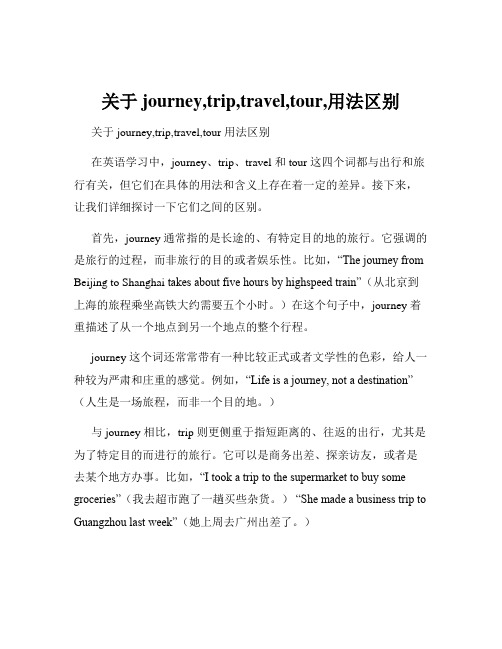
关于journey,trip,travel,tour,用法区别关于 journey,trip,travel,tour 用法区别在英语学习中,journey、trip、travel 和 tour 这四个词都与出行和旅行有关,但它们在具体的用法和含义上存在着一定的差异。
接下来,让我们详细探讨一下它们之间的区别。
首先,journey 通常指的是长途的、有特定目的地的旅行。
它强调的是旅行的过程,而非旅行的目的或者娱乐性。
比如,“The journey from Beijing to Shanghai takes about five hours by highspeed train”(从北京到上海的旅程乘坐高铁大约需要五个小时。
)在这个句子中,journey 着重描述了从一个地点到另一个地点的整个行程。
journey 这个词还常常带有一种比较正式或者文学性的色彩,给人一种较为严肃和庄重的感觉。
例如,“Life is a journey, not a destination”(人生是一场旅程,而非一个目的地。
)与 journey 相比,trip 则更侧重于指短距离的、往返的出行,尤其是为了特定目的而进行的旅行。
它可以是商务出差、探亲访友,或者是去某个地方办事。
比如,“I took a trip to the supermarket to buy some groceries”(我去超市跑了一趟买些杂货。
)“She made a business trip to Guangzhou last week”(她上周去广州出差了。
)trip 还可以用来表示在某个特定时间段内的一系列活动,比如学校组织的郊游或者公司组织的团队建设活动。
例如,“The school trip to the zoo was a l ot of fun”(学校组织的去动物园的郊游非常有趣。
)travel 是一个比较宽泛的概念,它可以泛指旅行、出行的行为,既可以是长途的,也可以是短途的;既可以是有目的的,也可以是没有目的的。
trip和travel的区别用法

trip和travel的区别用法摘要:1.引言:简要介绍trip和travel的区别2.定义和含义:解释两个词的基本含义和用法3.语境和场景:分析在不同场景中trip和travel的运用4.例句展示:给出实际例句,展示两者在实际应用中的区别5.总结:总结全文,强调正确使用trip和travel的重要性正文:【引言】在日常生活中,trip和travel这两个词经常被用来描述人们出行的行为。
尽管它们在很多情况下可以互换使用,但它们之间还是存在一定的差别。
接下来,我们将详细探讨这两个词的区别及其用法。
【定义和含义】首先,我们来了解一下这两个词的基本含义。
一般来说,travel(旅行)是指为了娱乐、度假、探亲访友或者参加会议等目的而进行的短期出行。
它可以包括长途旅行、短途旅行、国内旅行和国外旅行等。
而trip(旅程)更侧重于描述一次具体的出行过程,它可以是短途的,也可以是长途的,但通常是一次性的。
【语境和场景】在不同的语境和场景中,trip和travel有着不同的运用。
例如,当我们计划一次度假时,我们可能会说:“I want to go on a trip to Hawaii.”(我想去夏威夷旅行。
)这里用的是trip。
而如果我们说的是:“I want to travel around the world。
”(我想环游世界。
)这里就用的是travel。
【例句展示】以下是一些实际例句,帮助大家更好地理解trip和travel的区别:1.My family and I are planning a trip to the countryside this weekend.(我的家人和我计划这个周末去乡下旅行。
)2.I spent my summer vacation traveling across the United States.(我花暑假环游美国。
)3.She took a trip to Paris for her honeymoon.(她度蜜月去了巴黎。
travel verbs相关词语
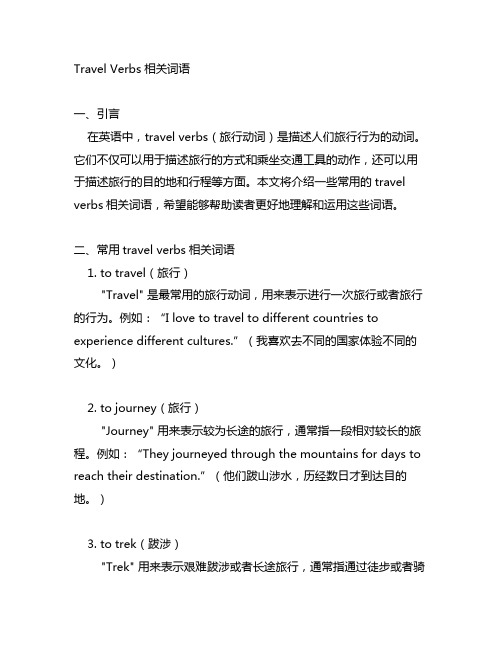
Travel Verbs相关词语一、引言在英语中,travel verbs(旅行动词)是描述人们旅行行为的动词。
它们不仅可以用于描述旅行的方式和乘坐交通工具的动作,还可以用于描述旅行的目的地和行程等方面。
本文将介绍一些常用的travel verbs相关词语,希望能够帮助读者更好地理解和运用这些词语。
二、常用travel verbs相关词语1. to travel(旅行)"Travel" 是最常用的旅行动词,用来表示进行一次旅行或者旅行的行为。
例如:“I love to travel to different countries to experience different cultures.”(我喜欢去不同的国家体验不同的文化。
)2. to journey(旅行)"Journey" 用来表示较为长途的旅行,通常指一段相对较长的旅程。
例如:“They journeyed through the mountains for da ys to reach their destination.”(他们跋山涉水,历经数日才到达目的地。
)3. to trek(跋涉)"Trek" 用来表示艰难跋涉或者长途旅行,通常指通过徒步或者骑行等方式进行旅行。
例如:“We trekked for miles through the forest to get to the remote village.”(我们长途跋涉穿越森林,最终到达了偏远的村庄。
)4. to hike(徒步旅行)"Hike" 通常用来表示进行长途徒步旅行,是指通过步行的方式进行旅行。
例如:“They hiked up the mountain to enjoy the breathtaking view from the top.”(他们一路徒步到山顶,享受了那里令人惊叹的景色。
travel的用法

travel的用法travel:1. travel的定义:travel 是一个动词,意思是旅行或者迁徙,是指经过一定路程到达目的地。
2. travel的用法:(1) 作为及物动词,travel 的基本含义是“(到尚未去过的地方)旅行”或者“(一段路程)游玩”,此时其宾语可以用一个名词、动名词或者从句表示。
比如:He is planning to travel to Beijing next year.他计划明年去北京旅游。
(2) travel 的宾语也可以是一个表示路程的数词或者介词短语,表示距离或方向上的位置,表示在旅行途中经过的路程。
比如:We traveled three hundred miles yesterday.我们昨天旅行了300英里路程。
We traveled west for four hours.我们向西旅行了4小时。
(3) travel 也可以用作不及物动词,指从一个地方到另一地方出现,常用来表示可能跨国境或者跨境的迁徙。
比如:They often travel to Thailand for holiday.他们经常到泰国旅游。
My friends travel around the country for business.我的朋友们为了生意到处旅行。
3. travel的被动语态:(1) travel 动词的被动语态表示某人被另一个或一群人带到另一个地方去旅行。
比如:She was traveled to Shanghai last year.去年她被带到上海旅行。
(2) 也可以表示“被送到另一地旅行”,表达的意思就像是一种好事一样。
比如:The injured child was traveled to the hospital by ambulance.受伤的孩子被救护车送去医院。
travel 用法

travel 用法
"travel" 是一个英语动词,表示从一个地方到另一个地方的活动。
以下是"travel" 的常见用法:
1. 旅行:表示从一个地方到另一个地方的活动,例如 "I am traveling to New York next week."(我下周要去纽约旅行。
)
2. 传播:表示信息、思想、文化等的传播,例如 "The news traveled quickly through the town."(消息在小镇上迅速传播开来。
)
3. 移动:表示物体的移动,例如 "The car traveled down the highway at
a high speed."(汽车在高速公路上高速行驶。
)
4. 游历:表示在某个地方或国家游览、参观,例如 "He traveled through Europe during his vacation."(他在假期里游历了欧洲。
)
5. 旅行者:表示经常旅行的人,例如 "She is a seasoned traveler who has been to many countries."(她是一个经验丰富的旅行者,去过很多国家。
)
需要注意的是,"travel" 是一个动词,如果要表示旅行的目的地或方式,需要加上相应的介词,例如 "travel to"(去某地旅行)、"travel by
plane/train/car"(乘飞机/火车/汽车旅行)等。
九下module1travel 知识点总结

--by the end到/在最后,表示到那时候,常常可以根据语境、时态看出。by the end of…后一般跟完成时态。
E.g.By the end of last month, I had learned 200 English words.
Module 1:Travel
重点单词/短语
direct, succeed, exactly, because of, as long as, take care, take off
重点句型
1. The train was full of people, and I had to stand for over three hours.
because
连词
后跟句子,是主句的直接原因
6.But the pilot succeeded in landing on time.不过飞行员成功地按时着陆了。【**succeed动词,意为“成功”。succeed in doing sth.意为“成功做成某事”。The boy succeeded in working out the maths problem.这个男孩成功地解出了这道数学题。
1)manage后接名词或动词不定式作宾语,不接动名词。manage to do sth.暗含succeed in doing sth.之意,指“(经过努力和克服困难之后)将某事坐成”,即经过努力达到了目的,重点在于结果。He managed to finish the work on time.
--in the end在最后,一般表示结果,强调的就是结果。E.g.I was saved in the end.。
常见动词不定式词组、句型用法总结
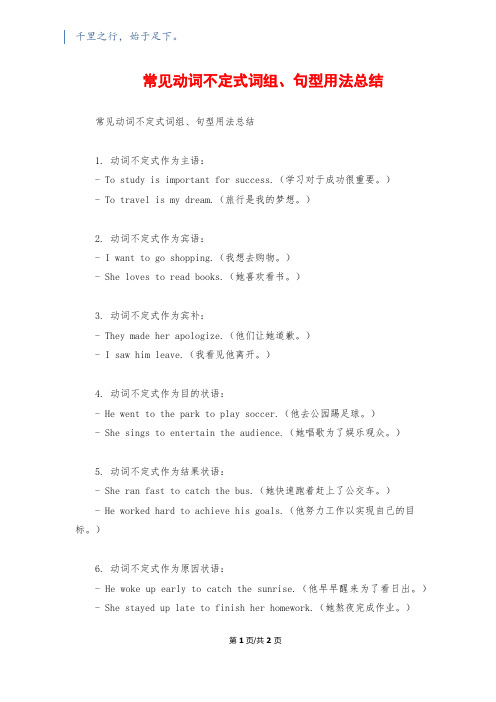
千里之行,始于足下。
常见动词不定式词组、句型用法总结常见动词不定式词组、句型用法总结1. 动词不定式作为主语:- To study is important for success.(学习对于成功很重要。
)- To travel is my dream.(旅行是我的梦想。
)2. 动词不定式作为宾语:- I want to go shopping.(我想去购物。
)- She loves to read books.(她喜欢看书。
)3. 动词不定式作为宾补:- They made her apologize.(他们让她道歉。
)- I saw him leave.(我看见他离开。
)4. 动词不定式作为目的状语:- He went to the park to play soccer.(他去公园踢足球。
)- She sings to entertain the audience.(她唱歌为了娱乐观众。
)5. 动词不定式作为结果状语:- She ran fast to catch the bus.(她快速跑着赶上了公交车。
)- He worked hard to achieve his goals.(他努力工作以实现自己的目标。
)6. 动词不定式作为原因状语:- He woke up early to catch the sunrise.(他早早醒来为了看日出。
)- She stayed up late to finish her homework.(她熬夜完成作业。
)第1页/共2页锲而不舍,金石可镂。
7. 动词不定式作为条件状语:- If you want to succeed, you must work hard.(如果你想成功,你必须努力。
)- You have to practice every day to improve your English.(你必须每天练习才能提高英语。
)8. 动词不定式作为伴随状语:- She listened to music to relax.(她听音乐放松。
travel用法

travel用法Travel是一个英语单词,通常指的是旅行或者旅游。
它可以用作名词、动词或者形容词,常见的用法如下:1. 名词用法Travel作为名词时,通常指的是旅行或者旅游。
例如:- I love travel. 我喜欢旅行。
- Travel broadens the mind. 旅行可以开阔眼界。
- My dream is to travel around the world. 我的梦想是环游世界。
2. 动词用法Travel作为动词时,通常表示去旅行或者行进。
例如:- I love to travel to exotic places. 我喜欢去异国情调的地方旅行。
- She travels a lot for her job. 她工作需要经常出差到其他地方。
- We are planning to travel through Europe next year. 我们计划明年环游欧洲。
3. 形容词用法Travel作为形容词时,通常用来描述与旅行相关的事物。
例如:- We need a travel guide for our trip. 我们需要一本旅行指南来帮助我们的旅行。
- My travel bag is packed and ready to go. 我的旅行包已经收拾好准备出发了。
- The travel industry has been hit hard by the pandemic. 旅游业受到了疫情的重创。
travel是一个非常常用的词汇,在日常生活中经常出现。
在进行旅行规划或者旅游活动时,也需要掌握一些相关的常用词汇,例如:- Travel destination: 旅行目的地- Travel itinerary: 旅行行程安排- Travel budget: 旅行预算- Travel insurance: 旅行保险- Travel documents: 旅行文件(例如护照、签证等)- Travel agency: 旅行社在进行英语交流时,也可以使用一些旅行相关的常用短语,例如:- Take a trip: 去旅行- Go abroad: 出国旅游- Staycation: 在家度假- Pack your bags: 收拾行李- Hit the road: 出发- Tourist attraction: 旅游景点在学习英语时,除了了解travel的基本用法和相关词汇短语之外,还可以通过看英文旅游杂志或者听英文旅游节目来扩大自己的词汇量和语感。
40个英语介词用法总结

40个英语介词用法总结3. on - used to indicate a surface or a specific day/date(e.g. on the table, on Monday)4. to - used to indicate direction or movement (e.g. go to school, travel to Spain)5. for - used to indicate a duration or purpose (e.g. for two hours, for studying)6. with - used to indicate the presence or use of something or someone (e.g. with a pen, with my friend)7. by - used to indicate the method or means of doing something (e.g. by car, by email)8. about - used to indicate the topic or subject of a discussion or writing (e.g. talk about the weather, write astory about dragons)9. from - used to indicate origin or starting point (e.g. from China, from the beginning)10. into - used to indicate movement or transformation (e.g. jump into the water, turn into a butterfly)11. off - used to indicate removal or separation (e.g. get off the bus, take off your shoes)12. on - used to indicate attachment or connection (e.g. put on your hat, turn on the lights)13. through - used to indicate movement from one side or end to the other (e.g. walk through the park, read through the book)14. across - used to indicate movement or position from one side to the other (e.g. swim across the river, the house is across the street)15. over - used to indicate movement or position above or higher than something (e.g. jump over the hurdle, the plane flew over the ocean)16. under - used to indicate movement or position below or lower than something (e.g. crawl under the table, the dog is under the bed)17. by - used to indicate proximity or next to (e.g. stand by the door, the park is by the beach)18. towards - used to indicate movement or direction towards someone or something (e.g. walk towards the exit, express your feelings towards others)19. into - used to indicate movement or position within something or a specific state (e.g. dive into the pool, stepinto the room)20. onto - used to indicate movement or position on top of something (e.g. climb onto the roof, put the book onto the shelf)21. beneath - used to indicate movement or position underneath something (e.g. hide beneath the bed, the treasure is buried beneath the sand)25. without - used to indicate the absence or exclusion of something (e.g. go without breakfast, write without mistakes)26. among - used to indicate being part of a group or surrounded by something (e.g. chat among friends, walk among the trees)27. beside - used to indicate a close proximity or next to(e.g. sit beside me, the car is beside the house)29. beyond - used to indicate movement or position further than something (e.g. go beyond your limits, the horizon is beyond the mountains)30. underneath - used to indicate position or movement below or under something (e.g. put the box underneath the table, crawl underneath the bridge)31. without - used to indicate the absence or lack of something (e.g. live without regrets, pass the exam without help)32. behind - used to indicate position or movement at the back of something (e.g. stand behind the chair, hide behind the tree)33. around - used to indicate movement or position in a circular or surrounding way (e.g. walk around the park, look around the room)34. within - used to indicate movement or position inside or within something (e.g. stay within the boundaries, the key is within the box)35. amid - used to indicate being surrounded by or in the middle of something (e.g. relax amid nature, speak amid the crowd)37. above - used to indicate position or movement higher than something (e.g. fly above the clouds, the temperature is above freezing)38. below - used to indicate position or movement lower than something (e.g. swim below the surface, the temperature is below zero)39. along - used to indicate movement or position next to or parallel with something (e.g. walk along the beach, the road runs along the river)。
travel和trip的用法
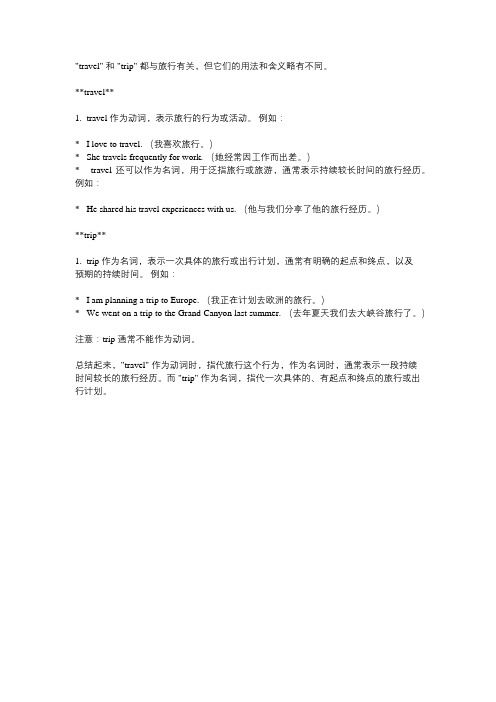
"travel" 和 "trip" 都与旅行有关,但它们的用法和含义略有不同。
**travel**
1. travel 作为动词,表示旅行的行为或活动。
例如:
* I love to travel. (我喜欢旅行。
)
* She travels frequently for work. (她经常因工作而出差。
)
* travel 还可以作为名词,用于泛指旅行或旅游,通常表示持续较长时间的旅行经历。
例如:
* He shared his travel experiences with us. (他与我们分享了他的旅行经历。
)
**trip**
1. trip 作为名词,表示一次具体的旅行或出行计划,通常有明确的起点和终点,以及
预期的持续时间。
例如:
* I am planning a trip to Europe. (我正在计划去欧洲的旅行。
)
* We went on a trip to the Grand Canyon last summer. (去年夏天我们去大峡谷旅行了。
)
注意:trip 通常不能作为动词。
总结起来,"travel" 作为动词时,指代旅行这个行为,作为名词时,通常表示一段持续
时间较长的旅行经历。
而 "trip" 作为名词,指代一次具体的、有起点和终点的旅行或出行计划。
Travel教学设计

Travel教学设计Travel instructional designTravel教学设计前言:小泰温馨提醒,英语作为在许多国际组织或者会议上都是必需语言,几乎所有学校选择英语作为其主要或唯一的外语必修课。
英语教学涉及多种专业理论知识,包括语言学、第二语言习得、词汇学、句法学、文体学、语料库理论、认知心理学等内容。
本教案根据英语课程标准的要求和针对教学对象是初中生群体的特点,将教学诸要素有序安排,确定合适的教学方案的设想和计划、并以启迪发展学生智力为根本目的。
便于学习和使用,本文下载后内容可随意修改调整及打印。
教学目标教学目标与要点 1.掌握打电话的一些方法和技巧,能熟练使用英语打电话,并且用语准确,特别注意英汉文化之间的差异。
2.学习归纳有关"travel"方面的词汇。
能够制定、描述、总结自己的某一次trip。
掌握相关的旅行常识。
3.学习宾语从句,掌握由that引导的宾语从句。
注意所有陈述(肯定或否定)句作宾语时,都应由that引导。
4.能够理解和运用部分动词所带否定的宾语从句的否定前置。
如:I don't think they can came on time.5.除会叙述旅行之外,我们还要给出We should write a short passage about travelling. What do you think of travelling? Is it good or bad? 等题目进行写的练习。
素质教育目标 1.学习新的语法知识:The Object Clause。
2.熟练掌握有关打电话和旅行的词汇、短语及日常用语。
3.鼓励学生在学习过程中锻炼听说读写的能力,并不断提高相关知识的语言应用能力。
4.向学生通过对旅行知识的学习,了解祖国的大好河山,教育他们热爱祖国、建设祖国、保卫祖国的理念。
教学建议关于本单元教材内容的分析本单元围绕“”这一中心话题,结合Lesson 14“Jim’s train ride”和与travel相关的对话Lesson 15开展教学活动。
方式介词的用法归纳
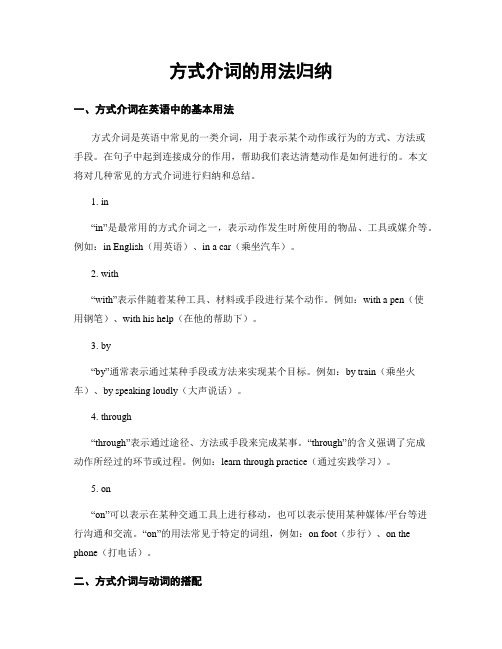
方式介词的用法归纳一、方式介词在英语中的基本用法方式介词是英语中常见的一类介词,用于表示某个动作或行为的方式、方法或手段。
在句子中起到连接成分的作用,帮助我们表达清楚动作是如何进行的。
本文将对几种常见的方式介词进行归纳和总结。
1. in“in”是最常用的方式介词之一,表示动作发生时所使用的物品、工具或媒介等。
例如:in English(用英语)、in a car(乘坐汽车)。
2. with“with”表示伴随着某种工具、材料或手段进行某个动作。
例如:with a pen(使用钢笔)、with his help(在他的帮助下)。
3. by“by”通常表示通过某种手段或方法来实现某个目标。
例如:by train(乘坐火车)、by speaking loudly(大声说话)。
4. through“through”表示通过途径、方法或手段来完成某事。
“through”的含义强调了完成动作所经过的环节或过程。
例如:learn through practice(通过实践学习)。
5. on“on”可以表示在某种交通工具上进行移动,也可以表示使用某种媒体/平台等进行沟通和交流。
“on”的用法常见于特定的词组,例如:on foot(步行)、on the phone(打电话)。
二、方式介词与动词的搭配具体的动词与方式介词的搭配是需要记忆和掌握的一项重要知识点。
下面列举了几个常见的搭配,以帮助读者更好地理解和运用这些方式介词。
1. speak in English(用英语说话)例句:He can speak fluently in English.2. travel by train/plane/bus/car(乘坐火车/飞机/公交车/汽车旅行)例句:I usually travel by plane when I go on vacation.3. write with a pen/pencil(用钢笔/铅笔写字)例句:She writes with a pencil because she likes to erase mistakes easily.4. learn through practice/study(通过实践/学习来学习)例句:You can improve your speaking skills through practice.5. communicate on the phone/internet(通过电话/互联网进行交流)例句:They often communicate with each other on the internet.三、表示方式的其他方式介词除了以上常见的方式介词外,还有一些其他表示方式和手段的介词也值得我们关注。
外研版九上Module-4-Travel-知识点总结

外研版九上Module-4-Travel-知识点总结一、词汇与短语- travel: 旅行- destination: 目的地- journey: 行程- sightseeing: 观光- transportation: 交通工具- tourist attractions: 旅游景点- explore: 探索- experience: 经历- local cuisine: 当地美食- souvenir: 纪念品- itinerary: 行程安排- guidebook: 导游书二、句型与用法1. How can I get to the hotel?我怎样才能到达酒店?2. I want to book a flight to Paris.我想预订往返巴黎的机票。
3. What are the must-see attractions in this city? 这个城市有哪些必看的景点?4. How long does it take to get to the airport? 去机场需要多长时间?5. I'm interested in local culture and history.我对当地文化和历史很感兴趣。
6. We had a great time exploring the old town. 我们在古城探索期间玩得很开心。
7. The hotel provides free Wi-Fi and breakfast. 酒店提供免费的无线网络和早餐。
三、文化背景知识- Paris is famous for its romantic atmosphere and iconic landmarks, such as the Eiffel Tower and Louvre Museum.- Traditional Chinese cuisine is known for its diverse flavors and regional specialties, such as Peking duck and Sichuan hot pot.- Many countries have their own traditional dances, such as the Flamenco in Spain and the Samba in Brazil.四、小结本模块主要介绍了旅行相关的词汇与短语,以及一些常用句型与用法。
travelling的用法
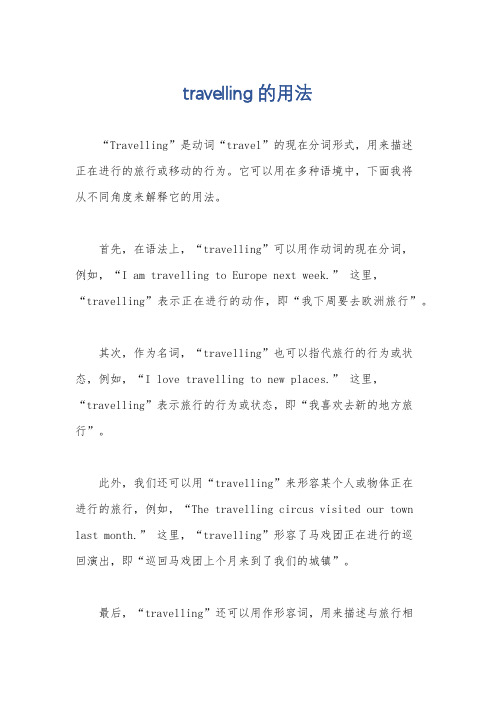
travelling的用法
“Travelling”是动词“travel”的现在分词形式,用来描述
正在进行的旅行或移动的行为。
它可以用在多种语境中,下面我将
从不同角度来解释它的用法。
首先,在语法上,“travelling”可以用作动词的现在分词,
例如,“I am travelling to Europe next week.” 这里,“travelling”表示正在进行的动作,即“我下周要去欧洲旅行”。
其次,作为名词,“travelling”也可以指代旅行的行为或状态,例如,“I love travelling to new places.” 这里,“travelling”表示旅行的行为或状态,即“我喜欢去新的地方旅行”。
此外,我们还可以用“travelling”来形容某个人或物体正在
进行的旅行,例如,“The travelling circus visited our town last month.” 这里,“travelling”形容了马戏团正在进行的巡
回演出,即“巡回马戏团上个月来到了我们的城镇”。
最后,“travelling”还可以用作形容词,用来描述与旅行相
关的事物,例如,“She works in the travelling industry.”
这里,“travelling”形容了与旅行相关的行业,即“她在旅行业
工作”。
总的来说,“travelling”是一个多功能的词汇,可以用作动词、名词和形容词,用来描述旅行或移动的行为、状态或相关事物。
希望这些解释能够帮助你更全面地理解“travelling”的用法。
travel的用法

travel的用法travel可用作及物动词,也可用作不及物动词,有长途行走,旅行,经长途运输仍不变质等含义。
用作名词有旅行,旅游等含义。
v.长途行走; 旅行; 游历; 以某速度、朝某方向或在某距离内行进,转送,传播; 经长途运输仍不变质; 经得住长途运输;n.旅行; 旅游; 游历; 出国旅游;第三人称单数:travels 复数:travels现在分词:travelling 过去式:travelled 过去分词:travelled一.用作名词1.旅行,行走Travel broadens the mind.旅行可以使人胸襟开阔。
2.游历; 游记Do you like books of travels?你喜欢读游记吗?二.用作不及物动词1.旅行,到远处去You are not fit to travel.你不宜外出旅行。
2.移动,传导The wheel travells along this bar.轮子顺着这根滑竿移动。
3.旅行推销,兜售My husband travels for a firm.我丈夫替一家公司作旅行推销。
4.飞速行进,飞驰That motorbike was really travelling.那辆摩托车开得飞快。
三.用作及物动词1.走遍He travelled the whole world.他周游了全世界。
2.走过…We have travelled a tortuous road.我们走过了曲折的道路。
感谢您的阅读,祝您生活愉快。
travel的用法总结大全

travel的用法总结大全travel的用法你知道多少,今天给大家带来travel的用法,希望能够帮助到大家,下面就和大家分享,来欣赏一下吧。
travel的用法总结大全travel的意思n. 旅行,进行,移动,漫游vi. 旅行,传送,前进,行进,[篮球]走步vt. 经过,通过,游历变形:过去式: travelled; 现在分词:travelling; 过去分词:travelled;travel用法travel可以用作名词travel的基本意思是“行走,行驶”,引申可指“旅行,旅游”,指某人到各个不同的地方所进行的多次旅行,尤指一段较长时间的出国旅行。
travel泛指旅行时,用作不可数名词,不加不定冠词; 如果指一次较长时间、且去过多处地方的旅游时,常用复数形式travels。
travel可指“旅行笔记,游记”,通常用复数形式,但不加many或数字修饰。
travel还有“一批旅客”的意思。
travel用作名词的用法例句He met many interesting people in his travels.旅行中他遇到了许多有趣的人。
Travel on that road is heavy on holidays.假日里,那条路上人来车往极为拥挤。
travel可以用作动词travel的基本意思是指行走、行驶、旅行、游历、走过、绕过某地区。
引申可表示“回想”。
还可表示“(被)传播”“运送”“外出推销或巡兜生意”。
travel可用作不及物动词,也可用作及物动词。
用作及物动词时,接名词、代词作宾语。
可用于被动结构。
表示“乘某种交通工具旅行”时, travel后可以接介词by, in或on+交通工具。
travel用作动词的用法例句You are hardly fit to travel alone at present.照目前的情况,你不宜单独旅行。
I travel 40 miles to work every day.我每天奔波40英里去上班。
travel的用法和短语例句

travel的用法和短语例句你学习过的单词travel中,你是否都能够掌握其短语以及它的例句用法呢?以下是店铺给大家带来travel的用法辨析和短语例句,以供参阅。
travel的用法travel的用法1:travel的基本意思是“行走,行驶”,引申可指“旅行,旅游”,指某人到各个不同的地方所进行的多次旅行,尤指一段较长时间的出国旅行。
travel泛指旅行时,用作不可数名词,不加不定冠词; 如果指一次较长时间、且去过多处地方的旅游时,常用复数形式travels。
travel的用法2:travel可指“旅行笔记,游记”,通常用复数形式,但不加many或数字修饰。
travel的用法3:travel还有“一批旅客”的意思。
travel的用法4:travel的基本意思是指行走、行驶、旅行、游历、走过、绕过某地区。
引申可表示“回想”。
还可表示“(被)传播”“运送”“外出推销或巡兜生意”。
travel的用法5:travel可用作不及物动词,也可用作及物动词。
用作及物动词时,接名词、代词作宾语。
可用于被动结构。
travel的用法6:表示“乘某种交通工具旅行”时, travel后可以接介词by, in或on+交通工具。
travel的用法7:travel还可指“快速移动”,用作不及物动词。
travel的常用短语travel by (v.+prep.)travel from (v.+prep.)travel in (v.+prep.)travel on (v.+prep.)travel over1 (v.+adv.)travel over2 (v.+prep.)travel to (v.+prep.)travel with (v.+prep.)travel的用法例句1. Students often travel hundreds of miles to get here.学生常常赶数百英里的路来到这里。
2. The drop in travel is bad news for the airline industry.旅游热降温对航空业来说是个坏消息。
travel的用法总结大全

travel的用法总结大全travel的用法你知道多少,今天给大家带来travel的用法,希望能够帮助到大家,下面就和大家分享,来欣赏一下吧。
travel的用法总结大全travel的意思n. 旅行,进行,移动,漫游vi. 旅行,传送,前进,行进,[篮球]走步vt. 经过,通过,游历变形:过去式: travelled; 现在分词:travelling; 过去分词:travelled;travel用法travel可以用作名词travel的基本意思是“行走,行驶”,引申可指“旅行,旅游”,指某人到各个不同的地方所进行的多次旅行,尤指一段较长时间的出国旅行。
travel泛指旅行时,用作不可数名词,不加不定冠词; 如果指一次较长时间、且去过多处地方的旅游时,常用复数形式travels。
travel可指“旅行笔记,游记”,通常用复数形式,但不加many或数字修饰。
travel还有“一批旅客”的意思。
travel用作名词的用法例句He met many interesting people in his travels.旅行中他遇到了许多有趣的人。
Travel on that road is heavy on holidays.假日里,那条路上人来车往极为拥挤。
travel可以用作动词travel的基本意思是指行走、行驶、旅行、游历、走过、绕过某地区。
引申可表示“回想”。
还可表示“(被)传播”“运送”“外出推销或巡兜生意”。
travel可用作不及物动词,也可用作及物动词。
用作及物动词时,接名词、代词作宾语。
可用于被动结构。
表示“乘某种交通工具旅行”时, travel后可以接介词by, in或on+交通工具。
travel用作动词的用法例句You are hardly fit to travel alone at present.照目前的情况,你不宜单独旅行。
I travel 40 miles to work every day.我每天奔波40英里去上班。
- 1、下载文档前请自行甄别文档内容的完整性,平台不提供额外的编辑、内容补充、找答案等附加服务。
- 2、"仅部分预览"的文档,不可在线预览部分如存在完整性等问题,可反馈申请退款(可完整预览的文档不适用该条件!)。
- 3、如文档侵犯您的权益,请联系客服反馈,我们会尽快为您处理(人工客服工作时间:9:00-18:30)。
travel的用法总结大全
travel的意思
n. 旅行,进行,移动,漫游
vi. 旅行,传送,前进,行进,[篮球]走步
vt. 经过,通过,游历
变形:过去式: travelled; 现在分词:travelling; 过去分词:travelled;
travel用法
travel可以用作名词
travel的基本意思是“行走,行驶”,引申可指“旅行,旅游”,指某人到各个不同的地方所进行的多次旅行,尤指一段较长时间的出国旅行。
travel泛指旅行时,用作不可数名词,不加不定冠词; 如果指一次较长时间、且去过多处地方的旅游时,常用复数形式travels。
travel可指“旅行笔记,游记”,通常用复数形式,但不加many或数字修饰。
travel还有“一批旅客”的意思。
travel用作名词的用法例句
He met many interesting people in his travels.旅行中他遇到了许多有趣的人。
Travel on that road is heavy on holidays.假日里,那条路上人来车往极为拥挤。
travel可以用作动词
travel的基本意思是指行走、行驶、旅行、游历、走过、绕过某地区。
引申可表示“回想”。
还可表示“(被)传播”“运送”“外出推销或巡兜生意”。
travel可用作不及物动词,也可用作及物动词。
用作及物动词时,接名词、代词作宾语。
可用于被动结构。
表示“乘某种交通工具旅行”时, travel后可以接介词by, in或on+交通工具。
travel用作动词的用法例句
You are hardly fit to travel alone at present.照目前的情况,你不宜单独旅行。
I travel 40 miles to work every day.我每天奔波40英里去上班。
When we speak, sound waves begin to travel in all directions.我们说话时,声波就开始向四面八方传播扩散。
travel用法例句。
